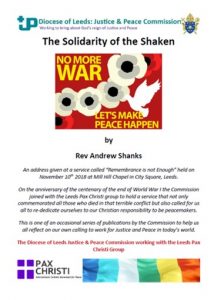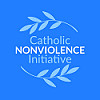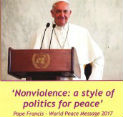The great illusion of violence is that it will solve our problems decisively. Unfortunately, conflicts often do not end when violence is used; they generally continue to smoulder or escalate. There is always residual resentment and injustice. What is our society’s answer to this spiral of violence? More violence. From this point of view, being human means becoming chronically suspicious of a world populated with real and potential enemies, where unresolved hurt and anger are forever mounting. The world can be dangerous, and we face conflicts our whole lives, but are we condemned to an endless cycle of retaliation and domination?
Violence crosses boundaries without permission. Violence disrupts authentic relationships. Violence separates us from others. It defiles the human person and desecrates the image of God. It is a process of economic, gender, racial, social and cultural domination.
FIND OUT MORE – DO MORE
CATHOLIC NONVIOLENCE INITIATIVE
The Gospel messages of nonviolence are not something we hear about all that often. This project of Pax Christi International, co-sponsored by the Pontifical Council for Justice & Peace, is a great place to start and find out more: what is nonviolence? Did Christ really call us to be nonviolent – what about the clearing of the temple market? What does nonviolence mean in our everyday lives?
Their website has background materials short videos as well as videos of webinars-plenty of ways to find out more and do more.
PAX CHRISTI
Pax Christi UK is the national Catholic peace organisation, part of the International Pax Christi peace movement. It is a membership organisation of individuals, families, communities and parishes from around the country.
Their website contains all sorts of background resources about peace-related issues – including many imaginative liturgy resources.
CAAT
The arms business has a devastating impact on human rights and security, and damages economic development. Large scale military procurement and arms exports only reinforce a militaristic approach to international problems. These are the issues that CAAT campaigns about and their website is a good starting point both for finding out more about the issues and for getting involved in action about them.
THE PEACE MUSEUM BRADFORD
For a different perspective on peace issues why not take a visit to the Peace Museum in Bradford. It explores the history and the often untold stories of peace, peacemakers, social reform and peace movements. It occupies three small galleries in one of Bradford’s many fine Victorian buildings. It is unique in that it is the only accredited museum of its kind in the UK.
THE SOLIDARITY OF THE SHAKEN
 Download this talk given by Rev Andrew Shanks as part of a service commemorating the centenary of the end of World War I. Simply click on the image to download the pamphlet which can be printed out as 8 A5 pages on two sheets of A4 paper if you have a duplex printer (select the booklet option in Adobe Reader).
Download this talk given by Rev Andrew Shanks as part of a service commemorating the centenary of the end of World War I. Simply click on the image to download the pamphlet which can be printed out as 8 A5 pages on two sheets of A4 paper if you have a duplex printer (select the booklet option in Adobe Reader).
We also have a booklet of Liturgy suggestions we prepared for the centenary of the end of World War 1 – which explores our continuing duty to be ‘peacemakers’ as well as the need for rememberance. It contains prayers and local stories that may be useful in other services where the focus is peace and reconciliation. Click here to download this booklet.
THE NONVIOLENCE OF THE GOSPELS
This is the text of a talk given on Peace Sunday at St Benedict’s Church in Garforth by Carol Burns and is one of an occasional series of ‘thought-provokers’ published by the Commission




